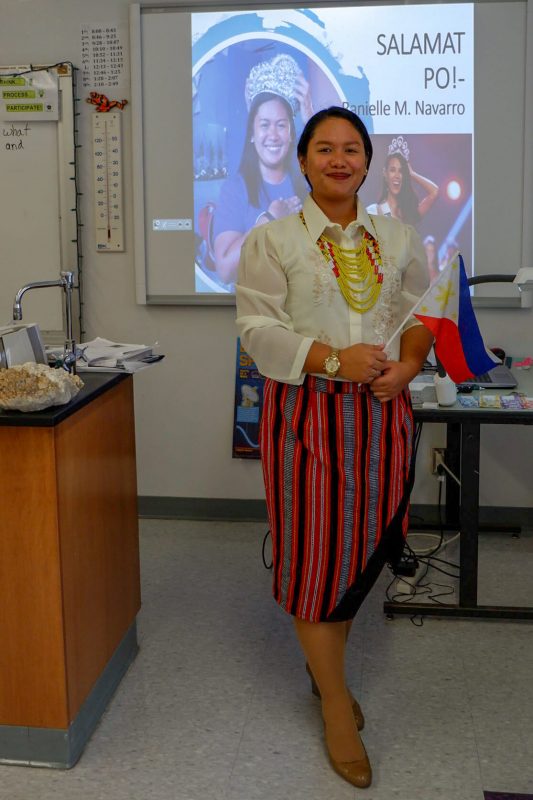First in a 4-part series of profiles on Fulbright Distinguished Awards in Teaching recipients
 Aware of her status as the youngest person in the group of 18 recipients of the Fulbright Distinguished Awards in Teaching Program for International Teachers (Fulbright DAI) spending the semester in Syracuse, Ranielle Navarro, an elementary science teacher from the Philippines, is soaking in as much as she can from her professors, host colleagues, and fellow Fulbright teachers. “Since I’m still considered a fairly young teacher in my profession, I really want to use this experience to broaden my horizons on how I can cater to the needs of my students and learn different pedagogical strategies and approaches that will help me better serve them and become a better teacher,” she explains.
Aware of her status as the youngest person in the group of 18 recipients of the Fulbright Distinguished Awards in Teaching Program for International Teachers (Fulbright DAI) spending the semester in Syracuse, Ranielle Navarro, an elementary science teacher from the Philippines, is soaking in as much as she can from her professors, host colleagues, and fellow Fulbright teachers. “Since I’m still considered a fairly young teacher in my profession, I really want to use this experience to broaden my horizons on how I can cater to the needs of my students and learn different pedagogical strategies and approaches that will help me better serve them and become a better teacher,” she explains.
And that’s exactly what she is doing, for example, by attending OCM BOCES workshops that included renowned authors like Mark Windschitl of the book, Ambitious Science Teaching, and resource speakers like Dr. Akihiko Takahashi of the organization Lesson Study Alliance, whom Navarro regards very highly.
“These are giants in this field,” she said. “To hear directly from them and see examples of how their approaches can be applied in the classroom was such a great learning opportunity.”
She shares that this experience was also very relevant to the research she is pursuing, which is honing literacy skills and sensemaking through project-based learning in science teaching for non-native English speakers. Her interest in this topic lies in the fact that there is a large emphasis on English fluency in the Philippines, with most of the curriculum being taught in English from elementary up to post graduate studies.
The challenge, according to Navarro is, “teachers are required to teach their students content while they are still learning the language,” which, as she explains, can result in failure to properly understand vital concepts to build upon. The result in the Philippines has been an above average literacy rate but low rankings when it comes to advancements in science and mathematics. Navarro is intent on finding new ways to, “cut across the curriculum” by linking literacy to science instruction. She says the audit courses she is taking in the School of Education have helped her with the inquiry project and will also be useful as she finishes her doctorate degree when she goes back to her country. Her knowledge of this topic also served her well when she was asked to participate as a panelist at the Central New York Reading Council’s Spring Conference, where she discussed her experience with literacy and concept learning in the Philippines.
Observing the science teachers in her host school in the Jamesville-Dewitt School District has been beneficial, as has her time with her host teacher, Ms. Kelly Colone, with whom she says she was, “perfectly matched.” “I am learning so much from her from her strategies and classroom management,” says Navarro, who has been particularly impressed with what she’s observed when it comes to how her host school addresses behavior of middle school students. Meeting every Wednesday, Navarro says the teachers, “sit and talk about certain behaviors of students and how they can address them. I appreciate that they are working collaboratively—not only on the academics of their students but how to help them with issues outside of academics. It only shows that they care for the welfare of the learners.”
Navarro is not the only one who stands to benefit from her time in Syracuse. She is making her mark on the people here as well. Her upbeat nature was apparent as soon as she arrived. Thomas Bull, assistant teaching professor and field experience coordinator of the Fulbright DAI project says she was, “all smiles after 36 hours of travel.” Navarro says when she saw the warm faces of Tom and his wife Nicki at the airport she thought, “This is going to be good; I’m going to like it here.” Since then, she has proudly taken her place in the Fulbright group as the “official, unofficial photographer,” pulling everyone in for group photos at the many cultural and social events they have attended.
“Without this opportunity, I don’t know if I ever would have gotten the chance to come and learn in the U.S.,” says Navarro. “I’m just really happy and grateful for every opportunity that it has provided and the exposure it has given me to diverse people with diverse beliefs, cultures, and points of view.”
